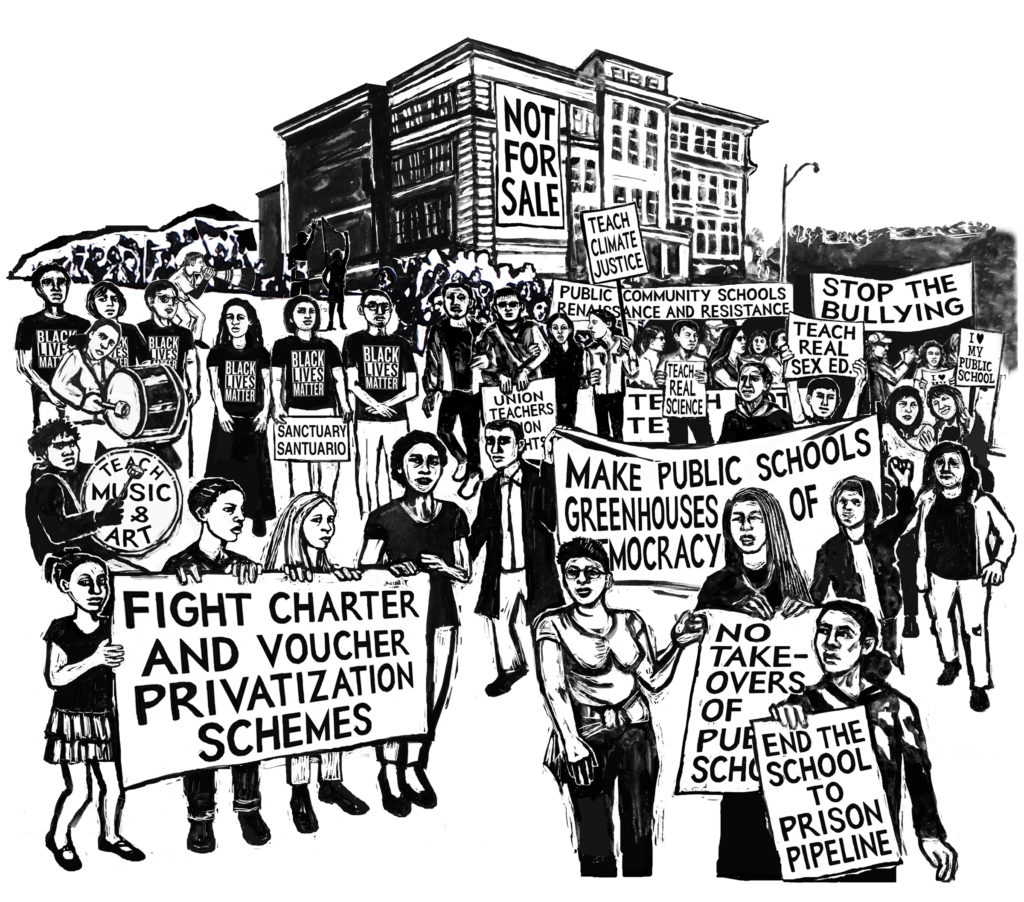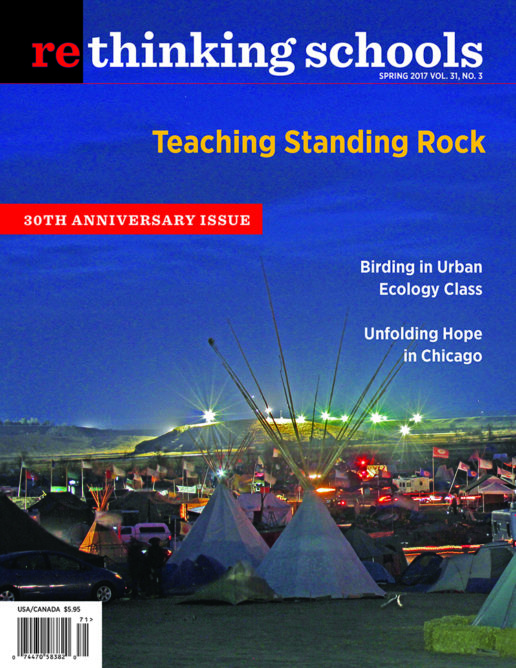Teaching in the Time of Trump
Illustrator: Susan Simensky Bietila

Rethinking Schools was born in the time of Reagan. We celebrate our 30th anniversary in the time of Trump. We know something about holding on to hope during hard times. Three decades ago, in our first editorial, we wrote “Don’t mourn, organize,” borrowing advice from the great labor troubadour Joe Hill.
If there were ever a time when we needed to heed this advice, that time is now. But exactly how we follow these words at this historical moment is not so clear.
We need to draw on everything we’ve learned about resistance and teaching for social justice through the years. But as educators, we know that we always have more to learn. That’s one reason we continue to publish Rethinking Schools and to invite readers to submit stories about their own teaching and school experiences as a way for educators and activists to inform and inspire one another, and to align our work with young people with our aspirations for a better, more just society.
As a multigenerational community, Rethinking Schools editors and contributors first built our shared understanding of the world and commitment to social justice in the movements for civil rights, against the American war in Vietnam, and for women’s liberation in the 1960s and 1970s. We continued to learn from struggles against U.S. intervention in Central America; and the anti-apartheid, LGBTQ, anti-Iraq war, and anti-globalization movements. More recently the Black Lives Matter, climate justice, immigrant rights, and Fight for $15 movements have inspired increasing numbers of educators to weave social justice concerns into their classrooms and identify with the principles of Rethinking Schools.
Now we face Trump and the rogue gallery of racists, billionaires, Islamophobes, misogynists, and privatizers who advise and serve him. And to make matters worse, at the federal level and in dozens of states, extreme right-wing Republicans control the legislative, executive, and sometimes the judicial branches of government. Moreover, the history and contradictions of the Democratic Party only underscore how much independent social movements will need to lead the resistance.
In his inaugural address, Trump made clear what he thought of public schools. He complained about the “carnage” that plagues this nation and gave as an example “an education system flush with cash but which leaves our young and beautiful students deprived of all knowledge.” And now he has Betsy DeVos as his secretary of education, an individual bathed in privilege who has spent her career undermining and privatizing public schools and promoting educational quackery like her Neurocore “brain performance centers.”
Under these circumstances, we not only have to become more effective social justice educators, but also guardians of our students’ safety and the fundamental health of public education. Moreover, we must also make the time to organize with others and participate in the growing movements to resist Trump and all aspects of his agenda.
As we reflect on our 30 years of publishing Rethinking Schools and working for educational justice, we’d like to share some lessons gleaned from this work:
Create social justice classrooms. We’ve championed the beauty and strength of classrooms that prefigure aspects of the kind of society we’d like to live in. We have promoted engaging classroom practices that draw on the liberatory theory of Paulo Freire and others. The characteristics of a social justice classroom that we first articulated in Rethinking Our Classrooms still animate our work and publications today. Our teaching should encourage students to ask critical questions of our world. It should prize activism and struggle, and also kindness, joy, and cooperation a curriculum of empathy that builds essential academic skills and powerful understandings. It’s a time for audacity in our work, not timidity. Trump may be president, but he is not president of our classrooms.
Make our schools greenhouses of democracy. Social justice teaching in one isolated classroom is hard to sustain. The most successful teaching takes place where entire schools are committed to such critical, participatory pedagogy. And, in contrast to Trump’s strongman declaration, “I alone can fix it,” our schools should enact democracy by being governed in a collaborative manner, with significant student, staff, family, and parent involvement. Given the unfolding political uncertainties, the creation of community schools as centers of renaissance and resistance anchors of hope in our communities will be one important way to fight the Trump agenda.
Nurture solidarity to counter racism and xenophobia. Trump’s assault on immigrants and refugees, and his dehumanization of people of color, are rooted in historic patterns of white supremacy, hostility toward immigrants, and fear-stoking demonization of “the other.” The first book we published was Rethinking Columbus, which offered educators and activists the tools to turn the Columbus-discovers-America myth on its head, and to look at these events from the standpoint of the people who were here first. Rethinking Columbus‘ initial press run of 30,000 copies in 1991 sold out in three weeks, and the publication went on to sell more than a quarter million copies. This response showed us that there were lots of educators who, like us, were sick and tired of a curriculum that sang the praises of white supremacy.
The Black Lives Matter movement and other long-standing struggles for justice set the context for resistance to this administration’s anti-immigrant and refugee attacks. At this moment, educators and schools have a great responsibility to ensure not only that students are safe and free from harassment and bullying, but also that we act in solidarity with students and families who face deportation.
Fight sexism, heterosexism, and transphobia. The sexism and misogyny displayed by our 45th president have been breathtaking. That millions of people could vote for him albeit not a majority underscores the importance of education work around gender discrimination. Especially beginning with work toward our recent book Rethinking Sexism, Gender, and Sexuality, we have sought to provide a vision of what educators are doing and can do to fight for women’s and gender equality. The massive marches organized by women the day after Trump’s inauguration showed the power of women’s leadership and jump-started the resistance that will be necessary to challenge Trump’s agenda.
Put children first, not data. The test-driven policies of the Bush and Obama administrations narrowed the curriculum and straitjacketed pedagogy. The threat now is that an administration deeply hostile to all things public will double-down on the test-and-punish policies begun in earnest with No Child Left Behind, but continued with even greater gusto under Obama and Duncan. We’ve always held that the best defense of public schools is to transform them to rethink our classrooms and schools, so that they genuinely meet the needs of the communities they serve. But as we work to improve public schools, we need to continue to oppose the use of standardized tests to discredit and defund them. Public schools need more resources, not fewer, and we need to fight for them.
Fight privatization of the commons. In 1988, shortly after we launched Rethinking Schools, we first warned of the dangers of school privatization. Milwaukee, where Rethinking Schools started, is home of the first and one of the largest publicly funded private religious school voucher programs in the nation, which has funneled nearly $2 billion of public funds into private schools. This is theft, plain and simple. Across the planet, this attack on the “commons” everything needed for the public good, especially schools is widespread. The appointment of Betsy DeVos as secretary of education and Trump’s pledge to pour $20 billion into private school voucher plans signal escalating attacks as religious zealots and privatizing charlatans at local and state levels are emboldened. We must continue to defend the promise of public schools, while working to ensure that they serve all students well.
Build international solidarity. More than ever, educators need to think internationally. Trump’s rise to power parallels the racialized, neo-fascist movements gaining strength in Europe including Marine Le Pen in France, Golden Dawn in Greece, and Geert Wilders in the Netherlands. Their scapegoating of the “other” continues the centuries-old privileging of the “white” north over the global south.
The massive worldwide demonstrations immediately following Trump’s inauguration were an encouraging sign that more and more people outside of the United States recognize the need for global solidarity to oppose the growing tendencies of hypernationalism and unfettered capitalism.
Through our books and magazine we have encouraged teachers to bring a global perspective to their teaching to teach critically about the “war on terror,” sweatshops and child labor, U.S. military intervention throughout the world, the occupation of Palestine, and the climate crisis. More than ever, we need to learn from the struggles of teachers and students in Mexico, Quebec, Chile, and throughout the world, and to see ourselves in solidarity with people everywhere who struggle for greater democracy and for a livable planet.
Build social justice unionism. For more than 20 years we have promoted an affirmative vision of social justice teacher unionism, characterized by increased democracy and participation by members, alliances with community groups, and attention to both social justice and pedagogical issues. The growing number of local and state teacher unions in both the National Education Association and the American Federation of Teachers that are putting into practice aspects of this type of unionism is encouraging, and we hope will inspire many other educators to push their unions in this direction. We will continue to publish articles that describe exemplary efforts to include our unions in the broader movement for social justice.
Support student activism. Children and youth are our best hope for creating a decent world. As educators, we have a moral and civic responsibility to be models for our students. Our classrooms should be places where students are motivated to think critically, look at multiple points of view especially those that have been silenced and evaluate whose interests those points of view serve. We should encourage students to take informed action inside and outside of the classroom. In the months following Trump’s election, thousands of students took to the streets across the country. We believe student activism will continue to grow, and we must nurture and support it. When students act on their beliefs and values about what is fair and just, they learn that democracy happens every day, not just on election day.
We’re All in This Together
We are heartened by the steady growth in recent years of organizing for social justice education, including the growth of teaching for social justice gatherings throughout the country. One of the longest-running is organized by Teachers 4 Social Justice every year in San Francisco; others have emerged in New York, Boston, Chicago, Milwaukee, Philadelphia, the Northwest, St. Louis, and elsewhere. Social justice education groups like Education for Liberation and Journey for Justice bring together teachers, students, parents, and activists to share experiences and talk strategy. Our rapidly growing movement has great potential to transform teacher unions, schools, and entire districts.
Thirty years ago, we began Rethinking Schools as a free newsprint tabloid for Milwaukee Public School educators. As we grew to reach an audience around the country, we continued to hope that what we published would help educators become better teachers and better organizers. Thirty years later, this remains our goal.
No doubt, we have incredibly hard times ahead. But we know of no better guidance than the words of Joe Hill we began with 30 years ago: “Don’t mourn, organize.”

